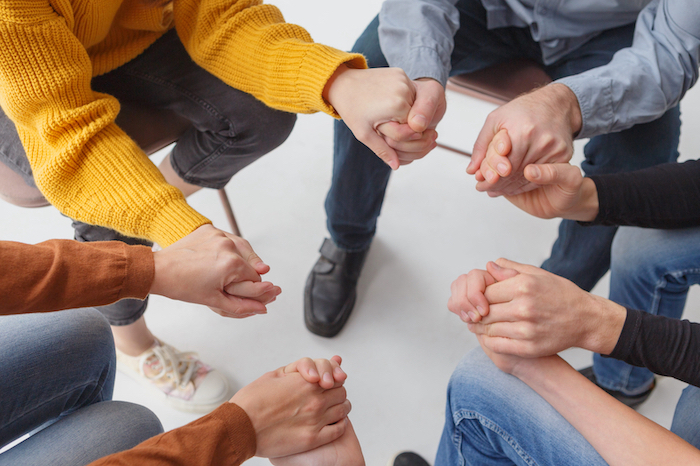Understanding how to find the right sponsor—it may take a few tries—and what personal information to share will go a long way toward success in recovery
This is the second installment in a two-part series. Read the first part here.
By Ryan Blackstock, PsyD
In Part I of this two-part series, I wrote about ways to go about finding a healthy meeting and table, as well as the idea of principles before personalities. In this article I want to tackle ideas about sponsorship, sharing in meetings and the nature of confidentiality.
Sponsorship is a crucial aspect of the program that many newcomers are hesitant to engage in. At its core, sponsorship is simply a relationship with another member in the program who serves as a mentor, and that person’s sole job is to take you through the 12-step process. Every sponsor-sponsee relationship is different. Some sponsors get very involved in the lives of their sponsees—giving them rides, going to court dates with them—and in the beginning might ask to have some form of daily contact or communication. Some people have a single sponsor throughout their recovery, and others will change at times, finding new sponsors who meet the demands of ongoing recovery.
Whatever amenities come with sponsorship, the primary task is to work through the 12 steps together. If you aren’t doing that, then you have a person in a support role, but not a sponsor.
There is freedom in this relationship, in that both the sponsor and the sponsee can end the relationship (sometimes people refer to it as being “fired”) at any time. If you think about this in terms of skills, you are the new person and have a big job ahead of you, and a sponsor is there to share their experience and show you the ropes. They become crucial to doing step work.
Sponsors are the most likely choice to work with someone on their fourth and fifth steps, and advise around steps 8 and 9. Just be mindful that despite whatever amenities come with sponsorship, the primary task is to work through the 12 steps together. If you aren’t doing that, then you have a person in a support role, but not a sponsor. This is also the prerequisite of being a sponsor—they need to have gone through the 12 steps themselves. There’s phrase I love about this that I’m sure comes from the late Father Martin. On this topic, he told a story of a client’s experience of sponsorship and said something akin to “The 12 steps are written in the book, so I could read them by myself, but it was through my sponsor that I learned and saw how the 12 steps were lived.”
Tips for Finding a Sponsor
As the psychologist at your disposal, I will provide some ideas about sponsorship—some good criteria to look for in a sponsor. In general:
Look for someone who seems to “have it together,” who “works a good program.” When you listen to them, you hear their history, but it seems that through their program, they seem relatively content with their life.
Look for someone you believe you can relate to. When someone shares their experiences, and you realize I have thought that, or felt that, or made those kinds of choices/mistakes, that is probably a good sign of some compatibility. It’s easy to look at the differences between ourselves and others; the challenge is to focus on our universality and connections.
No sponsor is perfect. The important thing is that you are engaged in learning about, and then “working,” the steps, applying them fully to your life.
Consider the aspect of time. You want someone with probably more than a year of sobriety time. Also, in terms of development, you may want someone who’s within about seven to 10 years of your age. Although people come from all walks of life, there are aspects of our development that are age-related. If you’re 22, you’re probably not worried about retirement yet, but if you’re older, this may be a stressor for you. Your sponsor doesn’t have to be an expert on everything, and when I say seven to 10 years, it’s not meant as a hard and fast rule. I am just trying to connect you with another person who might be encountering similar developmental issues—i.e., caring for young children, caring for aging parents, making the transition from high school to college, or college to the workforce, etc. Despite my recommendation, I will tell you that I have seen teenagers work well with sponsors who are retirees. If you also build a strong support network, you will have plenty of people to talk to about life issues while staying clean and sober.
Start with temporary sponsorship. This is a period where you will feel each other out to really see if you work well together. You may agree upon rules, or your sponsor may have some expectation—i.e., “call me three times a week.” Don’t let the question “Did I find the perfect sponsor?” hold you back. No sponsor is perfect. Sponsorship develops over time, and people fire their sponsors, get fired by them or just decide that it isn’t working out. The important thing is that you are engaged in learning about, and then “working,” the steps, applying them fully to your life.
Don’t get romantically involved. In the ’80s the advice would have been, “Men get male sponsors and women get women.” And that still may be a guideline. But with today’s focus on understanding intersectionality, I think the best guideline is to get a sponsor you won’t be romantically or sexually attracted to. Relationships in early recovery always complicate recovery and bring a certain level of risk. Your sponsor needs to be a safe person to whom you can express your authentic fears, guilt, hurt, remorse, etc. They should also serve as a bit of a role model. Choose your sponsor because you want to be like them, not with them.
Sharing in Meetings
Another key to making the 12 steps work is to be able to share your thoughts and experiences to the group. Here are some pointers:
It is okay to keep it brief, but participation is an important aspect of your recovery. You may not yet know what the Big Book says about a certain topic, but you can listen to others and share how you relate, even if it’s as simple as hearing a fellow member’s story of frustration, and you simply relate that you would be frustrated too. This is one of the elements that really works in a healthy 12-step community. Validating and normalizing helps people feel heard and not so alone. An easy example that often comes up is that people have dreams about using, but feel worried that this might mean their recovery is in jeopardy. That’s not true at all, so when someone speaks up and admits that they had dreams about using, quite often other members chime in and help them dispel that there is anything wrong with that. If you used daily for 10 years, part of your brain is still processing that you aren’t doing that anymore, and it just happens to come out at night.
When you’re early in recovery, it might be hard to see this, but your experience will help others. Our story and our success day to day in staying clean and sober is something we can always offer.
In general, speak from experience. If you heard something that helped you, or read something that helped you, that is all fair game to share. Theorizing or advice-giving is probably less helpful. When you’re early in recovery it might be hard to see this, but your experience will help others. Our story and our success day to day in staying clean and sober is something we can always offer. I think it’s common that for the newcomer to the program, the person who has managed to put together a few months of clean time might be far more impactful that the person with 20 years. Two decades might seem unrelatable, unfathomable at some level, but a few months is something the newcomer can see themselves doing, and so the feedback from the person with those few months becomes invaluable.
It is okay to ask questions to the group. It works better if you make the question personal. For example:
- “Sometimes I feel like I don’t fit in here”
- “I heard I am supposed to get a sponsor, but I don’t know how. I could use some feedback on that”
- “I have heard people talking about working the steps, but I don’t know what that means”
If you’re willing to ask a question in a meeting, then the hard part is over. Now you get to listen to feedback and learn. Don’t assume that no one else has ever wondered these things. That gets in the way. Just put it out there and learn. I’m betting people will be grateful you brought up the topic.
Only share once during a meeting, and if you have something else, your opportunity will be when people generally ask before closing if there is anything else people want to share. What you want to avoid is a “tennis match” between two people, where it becomes an individual session with a bunch of observers. Even if (or especially if) someone says something that you think is ignorant or incorrect, wait until the end or talk about it with them or someone else after the meeting. Short form: Don’t cross-talk or interrupt.
Don’t sit and just watch other people recover. People in early recovery need to talk in meetings.
Don’t be a bystander in meetings. I know there are sayings in early recovery about the need to listen. “You were born with two ears and one mouth, so do twice as much listening as talking.” Or I remember the old-time saying, “Take the cotton out of your ears and put it in your mouth, and pay attention for a change.” Yes, it’s important to listen and learn in meetings. My plea to you is this: Don’t be a bystander. Don’t sit and just watch other people recover—get in on the action yourself. If you are attending a meeting, it is as much for you as it is for anybody else.
I think people in early recovery need to talk in meetings. From a skills-based perspective, you have to get accustomed to speaking up, to asking questions, to sharing parts of your life a piece at a time, to asking for help and feedback. I tell you this because I believe that there will come a day when that skill set will make the difference between staying clean and sober under the hardest emotional circumstances, and relapse.
To develop a skill, you have to practice, and an invariable part of practice is making mistakes. In the beginning you might ramble a bit, but you’ll learn to rein it in. Or you might not express yourself exactly as you want to because you feel nervous, but with practice it will get easier. If you are sharing in meetings, especially if it’s uncomfortable or awkward, people will see your sincerity and your commitment to recovery.
Remaining Anonymous, Preserving Confidentiality
The topic of anonymity is important, but people often confuse its purpose. There are topics you share in meetings, and there are topics that are better suited to share one-on-one, with a therapist, close friend or sponsor. In the past, it was emphasized that “what is said here, stays here.” This was a reminder that when we share personal information, we hope that people don’t spread it around.
However, the 12-step fellowships are composed of people, and people talk. For this reason, you have to exert some caution about sharing personal details in meetings. If we study the psychology of secrets and secret sharing, we find that people have the most trouble with three topic areas:
- Mental illness diagnoses. This has improved as mental illness awareness is becoming mainstreamed, but there are still people who don’t understand that having bipolar disorder does not mean you are “crazy.” If you have had depression and suicide attempts, it’s not that you need to keep that secret, but find the right people to share it with.
- Sexual information. Sexual problems are a common consequence of addiction, and sexual behavior during our using days might be very important to work through. For example, some of my clients have only participated in sex while they were high, and it was that way for years. Now that they’re sober, they have concerns about arousal, performance and other sexual matters. Honestly, that is standard fare for any addiction therapist. But average people (not just folks in meetings) might have difficulty responding to and being helpful around those issues, and we know the sexual information of others is one of the more difficult kinds of information to keep private.
- “Stellar failures or losses.” Any situation that involves the loss of large amounts of money, or that affects fame or high social standing, seems to be hard for people to keep private. I have had clients who have made it into professional sports, and so had both money and status, but lost it to addiction. These members also get associated by their loss rather than their contributions to recovery: “That’s’ the guy who used to play for X team in the late ’90s.” Again, our strength is in our story, but we have to know whom to disclose it to.
You might be saying, “Yeah, but being Anonymous is literally in the title of the fellowships.” Yes, it is, but for different reasons than you might expect. The anonymity of the programs is really meant to ensure that the programs themselves don’t get bad reputations. People are welcome in the fellowship, but we are not supposed to advertise that we are now in AA. The reason for this is that if we relapse, others outside the program may think that the program is not successful, instead of focusing on the individual.
We don’t go out and brag that we are now in AA or NA. In fact, if you get to travel, you can often find the unsuspected AA meeting in hotels, but they’re usually listed as “Friends of Bill W.” That’s to retain anonymity. Certainly, AA set the guideline down in the Traditions that anonymity was to be maintained at the level of press, radio and film. They couldn’t have foreseen social media and the internet as we have it today. Anonymity is about keeping the program safe.
When someone is successful, it shows. No advertising of our success is necessary.
The basic scenario is this: Steve gets sober and posts all over his Facebook that he is now in AA and doing so much better. He gets lots of likes and encouragement. Six weeks later Steve has a relapse and makes drunken posts. The danger and risk is that one of Steve’s friends or family now comes to believe that AA doesn’t work. And this might deter them from seeking help themselves, or recommending it to others.
So please remember, Anonymity is a duty you carry if you are a member of one of the 12-step fellowships. When someone in recovery is successful, it shows. Regular non-addicted people notice it. They can’t always put their finger on it exactly, but they seem to detect the level of responsibility that comes with recovery, the insight and self-searching that is a fundamental part of the change process. Often, too, they see the altruism and gratitude that shines forth from a person who now lives a life they might have thought impossible during the throes of their addiction. No advertising of our success is necessary. The same Tradition (number 11 if you are curious) mentions that the program works on the basis of attraction rather than promotion.
If you are new to the fellowship and/or program, I welcome you, and I hope that these ideas help you build your best recovery possible. I wish you well.
Ryan Blackstock PsyD, LP, CAADC received his doctorate of psychology from the Center for Humanistic Studies in 2006 and has worked as an addiction counselor since the early 1990s. He earned a distinguished service award from the National Kidney Foundation (Michigan chapter) for pioneering a substance abuse education program for people awaiting organ transplant. Blackstock teaches at the Michigan School of Psychology master’s program. In his free time, he enjoys game design, playing heavy metal and studying symbolic aspects of ancient Egypt.
Top photo: LinkedIn














